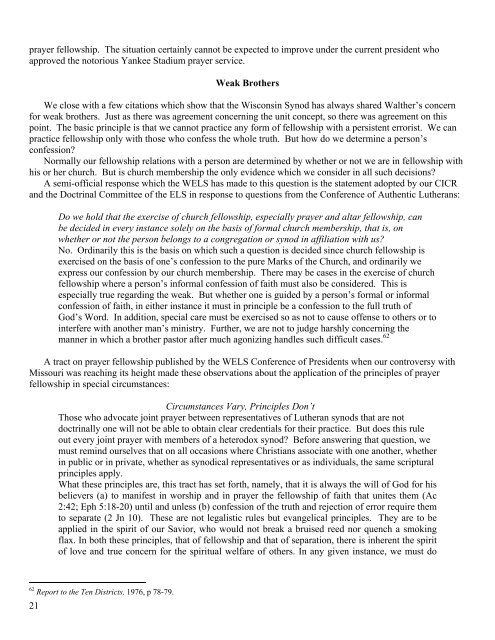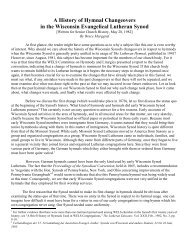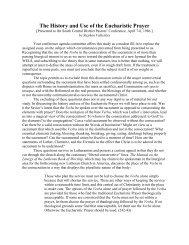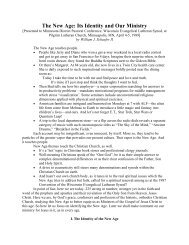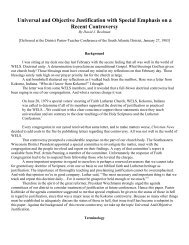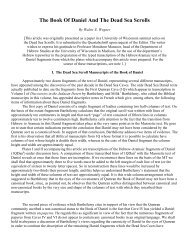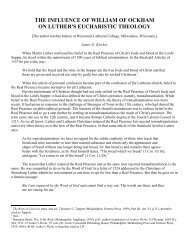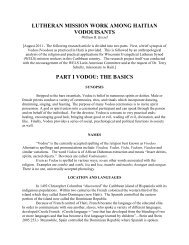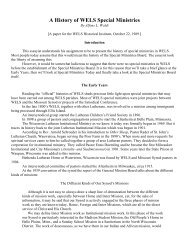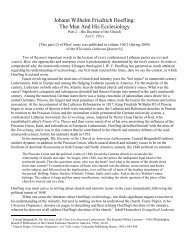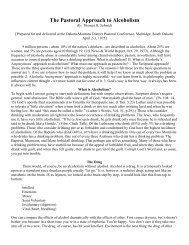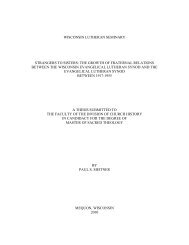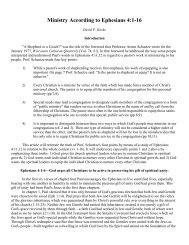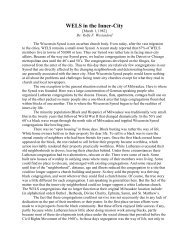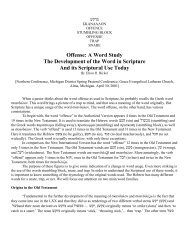The Synodical Conference and Prayer Fellowship - Wisconsin ...
The Synodical Conference and Prayer Fellowship - Wisconsin ...
The Synodical Conference and Prayer Fellowship - Wisconsin ...
You also want an ePaper? Increase the reach of your titles
YUMPU automatically turns print PDFs into web optimized ePapers that Google loves.
prayer fellowship. <strong>The</strong> situation certainly cannot be expected to improve under the current president who<br />
approved the notorious Yankee Stadium prayer service.<br />
21<br />
Weak Brothers<br />
We close with a few citations which show that the <strong>Wisconsin</strong> Synod has always shared Walther’s concern<br />
for weak brothers. Just as there was agreement concerning the unit concept, so there was agreement on this<br />
point. <strong>The</strong> basic principle is that we cannot practice any form of fellowship with a persistent errorist. We can<br />
practice fellowship only with those who confess the whole truth. But how do we determine a person’s<br />
confession?<br />
Normally our fellowship relations with a person are determined by whether or not we are in fellowship with<br />
his or her church. But is church membership the only evidence which we consider in all such decisions?<br />
A semi-official response which the WELS has made to this question is the statement adopted by our CICR<br />
<strong>and</strong> the Doctrinal Committee of the ELS in response to questions from the <strong>Conference</strong> of Authentic Lutherans:<br />
Do we hold that the exercise of church fellowship, especially prayer <strong>and</strong> altar fellowship, can<br />
be decided in every instance solely on the basis of formal church membership, that is, on<br />
whether or not the person belongs to a congregation or synod in affiliation with us?<br />
No. Ordinarily this is the basis on which such a question is decided since church fellowship is<br />
exercised on the basis of one’s confession to the pure Marks of the Church, <strong>and</strong> ordinarily we<br />
express our confession by our church membership. <strong>The</strong>re may be cases in the exercise of church<br />
fellowship where a person’s informal confession of faith must also be considered. This is<br />
especially true regarding the weak. But whether one is guided by a person’s formal or informal<br />
confession of faith, in either instance it must in principle be a confession to the full truth of<br />
God’s Word. In addition, special care must be exercised so as not to cause offense to others or to<br />
interfere with another man’s ministry. Further, we are not to judge harshly concerning the<br />
manner in which a brother pastor after much agonizing h<strong>and</strong>les such difficult cases. 62<br />
A tract on prayer fellowship published by the WELS <strong>Conference</strong> of Presidents when our controversy with<br />
Missouri was reaching its height made these observations about the application of the principles of prayer<br />
fellowship in special circumstances:<br />
Circumstances Vary, Principles Don’t<br />
Those who advocate joint prayer between representatives of Lutheran synods that are not<br />
doctrinally one will not be able to obtain clear credentials for their practice. But does this rule<br />
out every joint prayer with members of a heterodox synod? Before answering that question, we<br />
must remind ourselves that on all occasions where Christians associate with one another, whether<br />
in public or in private, whether as synodical representatives or as individuals, the same scriptural<br />
principles apply.<br />
What these principles are, this tract has set forth, namely, that it is always the will of God for his<br />
believers (a) to manifest in worship <strong>and</strong> in prayer the fellowship of faith that unites them (Ac<br />
2:42; Eph 5:18-20) until <strong>and</strong> unless (b) confession of the truth <strong>and</strong> rejection of error require them<br />
to separate (2 Jn 10). <strong>The</strong>se are not legalistic rules but evangelical principles. <strong>The</strong>y are to be<br />
applied in the spirit of our Savior, who would not break a bruised reed nor quench a smoking<br />
flax. In both these principles, that of fellowship <strong>and</strong> that of separation, there is inherent the spirit<br />
of love <strong>and</strong> true concern for the spiritual welfare of others. In any given instance, we must do<br />
62 Report to the Ten Districts, 1976, p 78-79.


